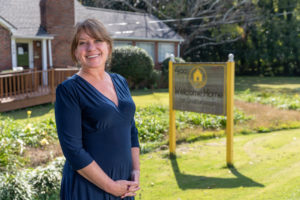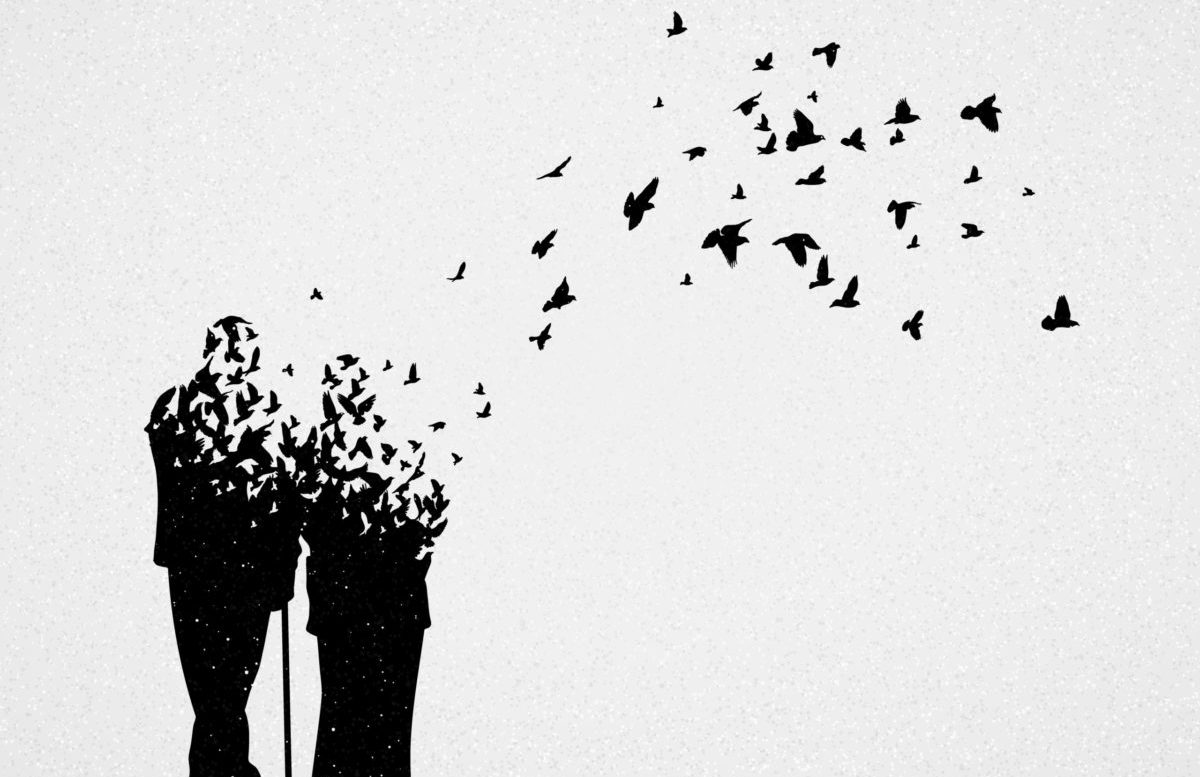Most people don’t talk about death.
For many of us, it’s an impulse that’s rooted in fear. At least 20% of Americans report a fear of dying. And that only includes those of us who are comfortable admitting we’re afraid.
Part of that fear is natural, says Sherry Campbell, founder of Welcome Home of Chattanooga, a sanctuary for people facing critical illness.

Editorial Photography by Dan Henry / DanHenryPhotography.com
But denial, anxiety and avoidance? Those are not.
“It’s difficult to acknowledge our own deaths because we don’t want to grow old — especially as Americans,” says Sherry. “We have this strong, beautiful culture, but death denial is a part of that culture. As a licensed social worker, what I’ve seen is that, most often, not talking about death only puts off the inevitable. Denial creates a situation where very difficult, very important conversations happen only during a crisis. But they could happen under much better circumstances.”
Q&A with Sherry Campbell
What’s your connection to death?
Sherry: At Welcome Home of Chattanooga, we provide shelter and family-type care to people who have terminal illness or cancer. Part of our mission is to help people feel more comfortable with death and dying, so death is a part of my everyday life.
Is dealing with death daily difficult?
Sherry: When people find out about the work that I do, they say, “It must be so depressing; There’s no way I could do that!” But, actually, it’s very sacred and holy ground.
If you think about babies being born as the beginning of life and death as the natural end of that life, it’s the same holy and sacred space. We want everyone to be able to live life fully — including people who are facing serious illness or death. And what we know is that, with a little help and support, they can.
What is death anxiety?
Sherry: Fear of death is sometimes known as death anxiety, and it has some common roots, including fear of:
- The unknown / nonexistence
- Pain and suffering (during death)
- Eternal punishment (post-death)
- Loss of control
- What will happen to loved ones
A certain level of death anxiety is normal. Death anxiety can become a problem when it’s:
- Irrational
- Uncontrollable
- Obsessive
- Disrupts your life
Why do people avoid talking about death?
Sherry: Death and dying can be a sad topic. In many ways, it’s that simple.
I’ve had someone close to me die suddenly. And I’ve had people I love very much in hospice. Both are tragic in different ways. But in the latter instance, to be present with someone who is dying — there’s a lot of comfort in that. There’s a peace that comes in being present with someone, respecting their wishes and keeping vigil for someone we love.
Why is it important to think about — and prepare for — death?
Sherry: If more people are comfortable talking about death and dying, we’ll have fewer people dying alone, hooked up to machines. Right now, a lot of people die alone simply because people might be nervous about visiting and saying or doing the wrong thing. That’s a fear we can erase.
On a personal level, preparing for your own death removes that burden from your family. If something happens to you and your healthcare wishes aren’t known, your family has to make those decisions at a very difficult time. Having those decisions made is a gift you can give them.
Finally, if you never think or talk about death, you actually miss out on a lot of the really good stuff of life. Forgiveness and love and gratitude — all of these wonderful things become clearer when you realize life doesn’t go on forever.
What is the death-positive movement?
Sherry: People who are death positive believe it shouldn’t be morbid or taboo to talk openly about death. We see honest conversations about death and dying as a key piece of a healthy society. The death-positive movement includes everything from talking about our final wishes and how we want to be treated, home funerals to natural/green burial. One way we’re part of this movement at Welcome Home of Chattanooga is our Demystifying Death course.
4 ways to consider death in a healthy way
Sherry: If we can get rid of the stigma around death, we can help everyone see and understand it better. Here are a few simple steps everyone can take to do that.
1. Don’t dwell on it
Sherry: Nobody should think about dying every day! Instead, focus on one thing you can do each day to live your best life.
2. Reflect on regrets
Sherry: From time to time, check in on your unfinished business. Ask yourself, if you died tomorrow:
- What regrets would you have?
- Who should you have reached out to?
- Who needs to know you love them?
- Who needs to know you forgive them?
3. Plan for your own death
Sherry: There are a lot of big questions around our own deaths.
- Who should speak for us if we can’t?
- How do we want to be treated?
- Do we want to be on life support?
One of the easiest ways to make sure you answer all the important questions is to use Five Wishes. It’s a simple guide people of all ages can fill out in about half an hour (once you’ve thought about your answers). Then you can give a copy to your doctor, your healthcare agent and your family.
4. Discuss your plans with loved ones
Sherry: Once you’ve made your plans, share them with your family. My family knows that my healthcare wishes are in my underwear drawer! We joke about it, but my kids know where my wishes are! And they know that those wishes include a description of what my room should look like if I’m ever unable to speak for myself. I want plenty of windows, pictures of family, my cats, and lots of music.
We tend to think of discussion about death as inherently sad, but they don’t have to be. They can be powerful and proactive, if difficult to get into. So let’s fix that, too: If you need a way to get into the discussion, say, ‘Hey, I read this article and it made me think…’ And there you go! You’re having the hard conversation.
7 tips for talking to aging parents about health
What are driveway discussions?
How one social worker learned how to have hard conversations
Sherry: As a social worker, I learned the importance of having hard conversations early.
I was visiting a family in Hamilton County, and the father was dying. Every time I visited, they’d all be happy — laughing, talking, cutting up. And then the family members would follow me to my car and ask questions about their dad’s condition. We call those “driveway discussions” in hospice care.
Eventually, I visited the dad while the family was out.
He said, “Sherry, I don’t think my family knows that I’m dying.”
I will never forget that moment. I said, “Why do you think that?”
And he said, “Because we don’t talk about it, and they act like nothing’s going on.”
That day, I learned something from him: I needed to be a bridge.
This family was looking to the father to see how to act, and he was trying to act normal because he didn’t want to hurt his loved ones. But that, in turn, was hurting him. Everyone was sad! But they didn’t know how to express that sadness, which is important.
Those sad moments are where we have the meaningful, powerful conversations that free us from regret later on. When death is a reality, you’re no longer in the shallow end of the pool. If you can be a bridge instead of a wall, you’re doing something beautiful.
Get more information about specific health terms, topics and conditions to better manage your health on bcbst.com. BlueCross BlueShield of Tennessee members can access wellness-related discounts on fitness products, gym memberships, healthy eating and more through Blue365®. BCBST members can also find tools and resources to help improve health and well-being by logging into BlueAccess and going to the Managing Your Health tab.


